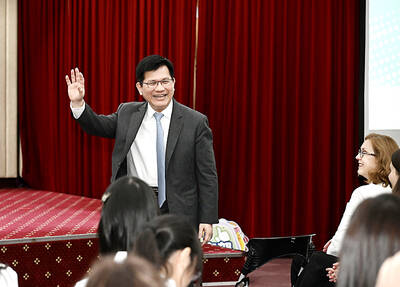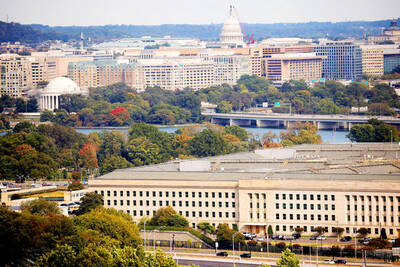Air France-KLM, Europe’s biggest airline, said yesterday it had swung to a heavy loss in the final three months of last year as the economic crisis reduced demand for flights and cargo traffic.
The group said the results “reflected the increasing severity of the economic downturn” and it announced it would cut 1,000 to 1,200 jobs this year through a hiring freeze and by not replacing retirees.
NET LOSS
In the final quarter of last year — the third quarter of Air France-KLM’s financial year — the group said it had made a net loss of 505 million euros (US$650 million) and an operating loss of 194 million euros.
A year earlier, it reported net profit of 139 million euros.
The net loss was much wider than an estimated loss of 274 million euros on average forecast by a consensus survey of 10 analysts provided by the company.
Revenues for the quarter were 5.97 billion euros, marginally lower than the 5.98 billion euros of the year before.
Air France-KLM, like other airlines, has had a tough year, facing record high fuel prices in the first half of the year and then a recessionary economic environment in the second.
EXPECTATIONS
For its full year results, which end on March 31, the group said it still expected to make an operating profit.
The company’s stock closed on Thursday at 7.73 euros a share. The stock is down from 18.09 euros a year ago. For the job losses, a spokesperson said this would be achieved without redundancies.
“There aren’t redundancies at Air France,” she said, adding that staff levels had been reduced by 2,000 last year.
The job losses reflected lower capacity on routes where smaller planes are being used or fewer flights are planned, she said.

FIREPOWER: On top of the torpedoes, the military would procure Kestrel II anti-tank weapons systems to replace aging license-produced M72 LAW launchers Taiwan is to receive US-made Mark 48 torpedoes and training simulators over the next three years, following delays that hampered the navy’s operational readiness, the Ministry of National Defense’s latest budget proposal showed. The navy next year would acquire four training simulator systems for the torpedoes and take receipt of 14 torpedoes in 2027 and 10 torpedoes in 2028, the ministry said in its budget for the next fiscal year. The torpedoes would almost certainly be utilized in the navy’s two upgraded Chien Lung-class submarines and the indigenously developed Hai Kun, should the attack sub successfully reach operational status. US President Donald Trump

Taiwan Semiconductor Manufacturing Co (TSMC, 台積電) is expected to start construction of its 1.4-nanometer chip manufacturing facilities at the Central Taiwan Science Park (CTSP, 中部科學園區) as early as October, the Chinese-language Liberty Times (the Taipei Times’ sister newspaper) reported yesterday, citing the park administration. TSMC acquired land for the second phase of the park’s expansion in Taichung in June. Large cement, construction and facility engineering companies in central Taiwan have reportedly been receiving bids for TSMC-related projects, the report said. Supply-chain firms estimated that the business opportunities for engineering, equipment and materials supply, and back-end packaging and testing could reach as high as

ALL QUIET: The Philippine foreign secretary told senators she would not respond to questions about whether Lin Chia-lung was in the country The Ministry of Foreign Affairs on Wednesday confirmed that a business delegation is visiting the Philippines, but declined to say whether Minister of Foreign Affairs Lin Chia-lung (林佳龍) is part of the group, as Philippine lawmakers raised questions over Lin’s reported visit. The group is being led by Deputy Minister of Agriculture Huang Chao-chin (黃昭欽), Chinese International Economic Cooperation Association (CIECA) chairman Joseph Lyu (呂桔誠) and US-Taiwan Business Council (USTBC) vice president Lotta Danielsson, the ministry said in a statement. However, sources speaking on condition of anonymity said that Lin is leading the delegation of 70 people. Filinvest New Clark City Innovation Park

DEFENSIVE EDGE: The liaison officer would work with Taiwan on drones and military applications for other civilian-developed technologies, a source said A Pentagon unit tasked with facilitating the US military’s adoption of new technology is soon to deploy officials to dozens of friendly nations, including Taiwan, the Financial Times reported yesterday. The US Department of Defense’s Defense Innovation Unit (DIU) is to send a representative to collaborate with Taiwan on drones and military applications from the semiconductor industry by the end of the year, the British daily reported, citing three sources familiar with the matter. “Drones will certainly be a focus, but they will also be looking at connecting to the broader civilian and dual-use ecosystem, including the tech sector,” one source was